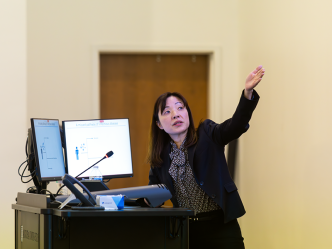In an era where artificial intelligence is reshaping how we live, work and learn, Trent Kays, PhD, assistant professor and director of college composition in the Department of English and World Languages of the Katherine Reese Pamplin College of Arts, Humanities, and Social Sciences, is leading an important conversation on how educators can adapt and thrive. Selected as a 2025 Governor’s Teaching Fellow, Kays is using this prestigious opportunity to explore how AI literacy can be embedded into writing and communication education.
The Governor’s Teaching Fellows Program, run by the University of Georgia’s Institute of Higher Education, helps improve college teaching across Georgia. It offers two options: a year-long fellowship and a one-week symposium focused on a timely topic. This year’s symposium, held May 19-23, explored “Artificial Intelligence in the Holistic Classroom.”
Kays was selected through a competitive two-step process. He was first nominated by Augusta University, then chosen as one of only 16 faculty members statewide. A major goal of the program is for fellows to bring what they learn back to their campuses. Kays plans to lead a campus-wide workshop on AI in the classroom next year to share new strategies with AU faculty and staff.
“My research focuses on digital rhetoric, professional and technical writing and communication, particularly how language is used and abused online,” Kays explained. His interest lies in preparing students to navigate a changing professional landscape shaped by emerging technologies.
While the May symposium isn’t structured as a traditional teaching forum, Kays sees it as a collaborative space for strategizing how AI can be effectively integrated into higher education.
Rather than shying away from the AI tools many students already use, Kays is working to meet them where they are. He’s helping to develop a department-wide AI and writing module that will be embedded into all students’ online learning platforms.
“It would be a disservice not to teach students how to use AI tools critically,” he said, adding that his goal is not only to demystify AI but also to foster thoughtful, informed usage.
“Dr. Kays is a leader at Augusta University when it comes to integrating GenAI into the classroom instruction. He finds innovative ways to teach students and his colleagues essential AI literacy skills,” said Candis Bond, PhD, interim department chair of English and World Languages. “I am thrilled he will have this opportunity to add to his expertise through the Governor’s Teaching Fellows May Symposium, and that he will be able to bring what he learns back to AU to help faculty across the institution think critically about AI in their classrooms.”
The inspiration for his fellowship proposal stemmed from his own experiences directing college composition and professional writing programs.
“I hit a wall,” he admitted. “I kept wondering, ‘How do we write student learning outcomes that consider AI? And should we use AI to write them?’”
This cycle of questions led him to believe that many other educators were likely facing the same dilemma, and he saw the symposium as a way to find collective answers.
“Dr. Trent Kays does excellent work, and we are excited about this opportunity for him and the whole university,” said Kim Davies, PhD, dean of Pamplin College. “Since he is working on developing something for the Department of English and World Languages, it will benefit all undergraduate students at AU since our faculty in English and World Languages teach students across the university.”
As the symposium approached, Kays was looking forward to diving deep into classroom design with peers from across the state.
“We’ll be creating new activities and assignments that look at AI through multiple lenses: rhetoric, ethics, functionality and figuring out how to apply them across disciplines,” Kays said.
He was especially excited about one potential new course – “Rhetorics of Artificial Intelligence,” a class that would challenge students to evaluate what AI does well and where it falls short.
“Maybe it’s good at certain tasks, but creativity and human judgment still matter,” he said.
Beyond the academic gains, Kays was simply excited to spend focused time thinking and collaborating. For Kays, AI in education isn’t about replacing human thinking; it’s about enhancing it.
“Students are already using these tools. Our job is to help them use them well.”
 Augusta University
Augusta University




